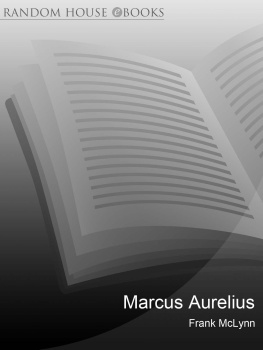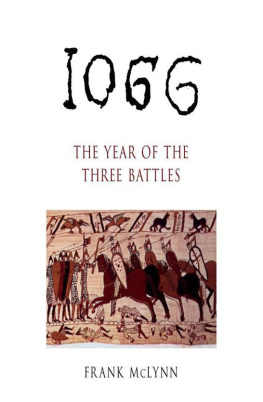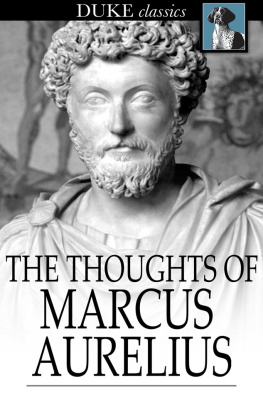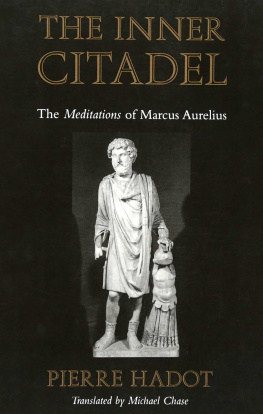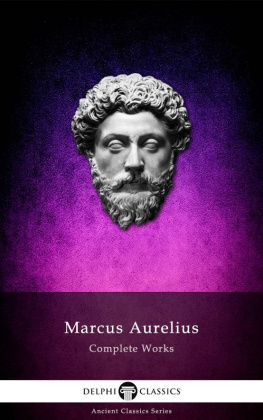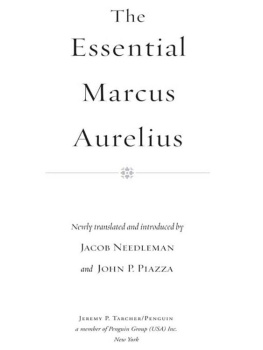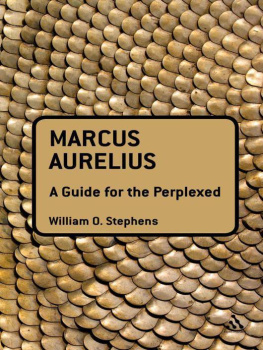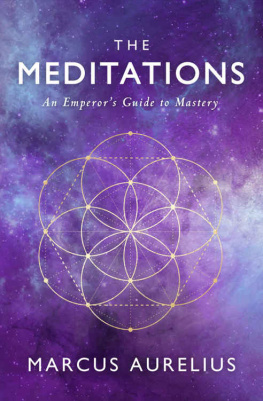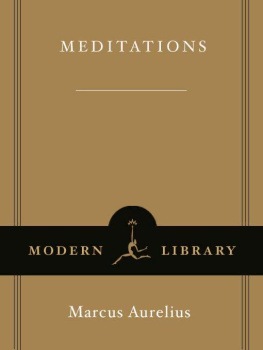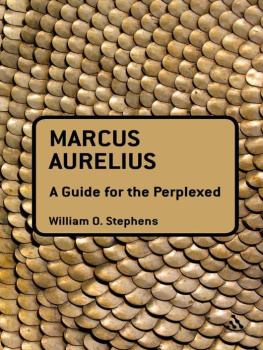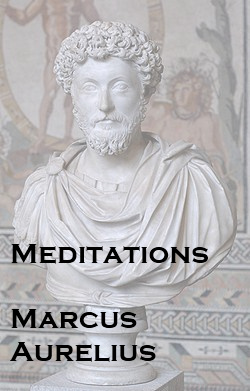Marcus Aurelius
Warrior, Philosopher, Emperor
Frank McLynn

CONTENTS
ALSO BY FRANK MCLYNN
France and the Jacobite Rising of 1745
The Jacobite Army in England
The Jacobites
Invasion: From the Armada to Hitler
Charles Edward Stuart
Crime and Punishment in Eighteenth-Century England
Stanley: The Making of an African Explorer
Snow Upon the Desert: The Life of Sir Richard Burton
From the Sierras to the Pampas: Richard Burtons Travels in
the Americas, 1860-69
Stanley: Sorcerers Apprentice
Hearts of Darkness: The European Exploration of Africa
Fitzroy Maclean
Robert Louis Stevenson
C.G. Jung
Napoleon
1066: The Year of the Three Battles
Villa and Zapata
Wagons West: The Epic Story of Americas Overland Trails
1759: The Year Britain Became Master of the World
Lionheart and Lackland: King Richard, King John and the
Wars of Conquest
Heroes and Villains
About the Author
Frank McLynn is the author of many critically acclaimed books, including Napoleon, 1066, Villa and Zapata, Wagons West, Stanley, 1759 and Lionheart and Lackland.
INTRODUCTION
Why should we be interested in a Roman emperor who lived 2,000 years ago? We can scarcely summon up any interest in the presidents, prime ministers and rulers of yesteryear unless they were political giants or monsters of evil. There can be many answers to this question, and not just in terms of the validity of studying history in general. Marcus Aurelius is the one figure of antiquity who still speaks to us today. We may thrill to the exploits of Alexander the Great, Hannibal or Caesar, and historical novelists may beguile us for a while with their reconstructions of Cicero or Julian (the only other figures from ancient history, apart from Caesar and Marcus Aurelius whose mental processes we know well), but the only voice from the Greco-Roman world that still seems to have contemporary relevance is that of the man who ruled the Roman empire from 161 to 180 A.D. The continuing sales of his book of reflections the Meditations alone prove that, but other evidence is not hard to find. We continue to use the tag Marcus Aurelius for a ruler who is wise. A reviewer surveying a series of interviews with King Juan Carlos of Spain remarked that he was very far from being Marcus Aurelius; the radical right-wing U.S. commentator and politician Pat Buchanan famously remarked that George W. Bush was no Marcus Aurelius. Meanwhile Bushs predecessor in the White House, Bill Clinton, claimed to have read and reread Marcuss book during his presidency. The nineteenth-century writer Samuel Butler claimed that no one is really dead if they are still widely remembered, and on this basis Marcus Aurelius is more alive than most people living. His survival as a major influence has puzzled and even embarrassed some people, who have attempted to deal with the phenomenon by facetiousness.
Marcus Aureliuss widespread popularity today can be seen at a number of levels, some apparently trivial, others deadly serious. He is the only Roman emperor the movies have taken seriously and also the best represented on the screen. Roman emperors usually function as footnotes in films set in imperial Rome (one thinks of Ivan Triesault as Nero in Barabbas or George Relph as Tiberius in Ben-Hur) or are presented in melo dramatic turns, as with Jay Robinson as Caligula in The Robe or Peter Ustinovs famous comico-tyrannic turn as Nero in Quo Vadis. Yet in Gladiator and The Fall of the Roman Empire, (played respectively by Richard Harris and Alec Guinness), Marcus Aurelius appears as a serious figure in all senses. But it is not just through celluloid presentations that Marcus has lived on. I would like to suggest that his current eminence has five main sources. In the first place, he satisfies the thirst for philosophical guidance which ancient philosophers thought they had a duty to perform but which their modern counterparts have largely abandoned. With the exception of a handful of lone wolves like Karl Jaspers, Jean-Paul Sartre and George Santayana, modern philosophy has retreated from the hurly-burly of everyday life to concern itself with technical issues of ever more esoteric import. In Europe the taste was for logical positivism and phenomenology, in the United States for symbolic logic, pragmatism or abstruse philosophy of science, while Britain retreated into the inane and scholastic cul-de-sac of linguistic philosophy. Faced with this abdication of responsibility from professional philosophers, the man and woman in the street turned either to Oriental mysticism or to the ancients. Academic specialists and desiccated pedants sneer that ordinary people use the Meditations as a bran-tub of aphorisms for all seasons and object that wisdom should not be obtained from tea-chest mottoes and that no philosophy worthy of the name should be of the cracker-barrel variety. Yet those who can find no consolation in organised religion are deeply attracted to Marcuss oracular utterances, of which dozens have attained popularity.
It is worth reminding ourselves of some of them. The universe is change; or life is what our thoughts make it. Nothing happens to anyone that he is not fitted by Nature to bear. Do not despise death, for even death is one of the things that Nature wills. By a tranquil mind I mean a well-ordered one. It is the act of a madman to pursue impossibilities. How much more grievous are the consequences of anger than the cause of it. How ridiculous and unrealistic is the man who is astonished at anything that happens in life. Loss is nothing else but change, and change is Natures delight. Life is warfare, and the sojourn of a stranger, and after fame comes oblivion. To the wise, life is a problem; to the fool a solution. If you are distressed by anything, the pain is not due to the thing itself but to your own estimate of it; and this you have power to revoke at any moment. Remember that there is a proper dignity and proportion to be observed in the performance of every act in life. The object in life is not to be on the side of the majority but to escape finding
A second reason for Marcuss continuing prominence could be that his embrace of Stoicism when a ruler chimes with a similar embrace by Americans of the philosophy of pragmatism, the ideas of judging truth by its consequences. Just as Stoicism was the Roman philosophy par excellence, could anything be more American than a creed one of whose leading practitioners (William James) could speak of the cash value of an idea? There is also a ternary motif at work, and we shall see that triads were an obsession of Marcus. The three chief Stoics of the Roman era, Seneca, Epictetus and Marcus Aurelius, find an echo in the three American pragmatists: C.S. Pierce, William James and John Dewey. Students of philosophy, incidentally, will be able to link Deweys quasi-Hegelian holism with similar ideas in Marcuss thought. Pragmatism is one of the hidden factors behind the dominance of the law and lawyers in U.S. society, because of the tendency to dissolve all philosophical and ethical issues into legal ones, or the indeterminate into the determinate. If there is a conflict between two equal and opposite values, as there often is in liberal and open societies, the Supreme Court will solve the dilemma for you. Naturally, this will always be done in a rough-and-ready

